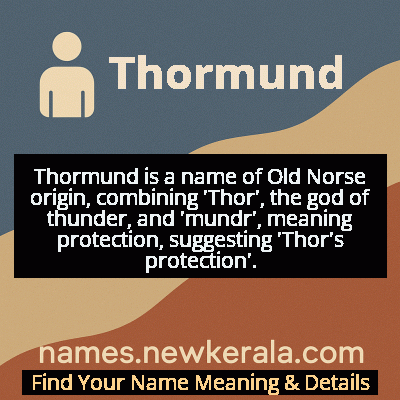Thormund Name Meaning & Details
Origin, Popularity, Numerology Analysis & Name Meaning of Thormund
Discover the origin, meaning, and cultural significance of the name THORMUND. Delve into its historical roots and explore the lasting impact it has had on communities and traditions.
Name
Thormund
Gender
Male
Origin
Christian
Lucky Number
5
Meaning of the Name - Thormund
Thormund is a name of Old Norse origin, combining 'Thor', the god of thunder, and 'mundr', meaning protection, suggesting 'Thor's protection'.
Thormund - Complete Numerology Analysis
Your Numerology Number
Based on Pythagorean Numerology System
Ruling Planet
Mercury
Positive Nature
Adventurous, dynamic, curious, and social.
Negative Traits
Restless, impatient, inconsistent, prone to indulgence.
Lucky Colours
Green, white.
Lucky Days
Wednesday.
Lucky Stones
Emerald.
Harmony Numbers
1, 3, 9.
Best Suited Professions
Sales, marketing, travel, entertainment.
What People Like About You
Versatility, charisma, adventurous spirit.
Famous People Named Thormund
Thormund the Old
Viking chieftain
Legendary Norse explorer who established settlements in Iceland
Thormund Eriksson
Christian missionary
Helped convert Norse communities to Christianity in Scandinavia
Thormund Larsen
Norwegian painter
Known for religious artworks depicting Christian themes in Norse cultural context
Thormund Johansson
Swedish theologian
Authored influential works on Christian-Norse cultural synthesis
Name Variations & International Equivalents
Click on blue names to explore their detailed meanings. Gray names with will be available soon.
Cultural & Historical Significance
Throughout medieval Scandinavia, Thormund became popular among families maintaining cultural heritage while embracing Christianity, particularly in Iceland and Norway where the transition was more gradual. The name appears in several Icelandic sagas and historical records, often borne by chieftains and influential figures who played roles in the Christianization process. These individuals typically represented the synthesis of Norse warrior values with Christian virtues, embodying the cultural transformation occurring across Scandinavia.
The name's persistence into modern times reflects ongoing cultural memory and the value placed on historical continuity. In contemporary Scandinavia, Thormund serves as a reminder of the complex religious history that shaped the region, representing how cultural elements can be preserved and reinterpreted rather than erased during periods of significant change.
Extended Personality Analysis
Individuals named Thormund are typically perceived as strong, protective, and principled. They often exhibit natural leadership qualities combined with a deep sense of responsibility toward others. The 'Thor' element in their name suggests strength and reliability, while the 'mund' component (meaning protection) indicates a nurturing, guardian-like nature. Thormunds are frequently described as having steadfast moral compasses, making them trusted advisors and loyal friends who others naturally turn to in times of need.
These individuals tend to be practical problem-solvers who approach challenges with determination and resilience. Their protective instincts extend beyond physical safety to emotional and spiritual well-being of those in their care. While they can be traditional in their values, they also possess the wisdom to adapt when necessary, reflecting the name's historical context of cultural and religious transition. Many Thormunds display a unique blend of strength and compassion, making them effective in roles requiring both authority and empathy.
In social settings, Thormunds often serve as stabilizing forces—calm in crisis, decisive in action, and protective of community harmony. They may gravitate toward professions involving protection, guidance, or cultural preservation, such as teaching, counseling, historical preservation, or community leadership. Their inherent sense of duty often makes them reliable family members and dedicated professionals who honor commitments and traditions while remaining open to necessary evolution.
Modern Usage & Popularity
Thormund remains a relatively rare but culturally significant name in modern times, primarily used in Scandinavian countries and among people of Norse heritage worldwide. While it never reached mainstream popularity, it has experienced a modest resurgence in recent years due to increased interest in Norse mythology and Viking history sparked by popular media, historical documentaries, and genealogy research. In Norway and Iceland, where traditional names are particularly valued, Thormund appears occasionally in birth records, often chosen by parents seeking a name that honors cultural heritage while remaining distinctive. The name's usage patterns show it's particularly popular among families with strong connections to Scandinavian traditions or those appreciating historical names with deep meaning. In English-speaking countries, Thormund is extremely rare but occasionally appears in communities with Norse cultural associations or among enthusiasts of medieval history. The name's current usage reflects a broader trend of reviving historical names that carry significant cultural and symbolic weight.
Symbolic & Spiritual Meanings
Symbolically, Thormund represents the convergence of divine protection and earthly strength. The name carries deep metaphorical significance as a bridge between ancient warrior traditions and spiritual guardianship. The 'Thor' element symbolizes not just physical strength and thunder, but also fertility, consecration, and protection—qualities that were seamlessly transferred to Christian understanding of divine power. The 'mund' component extends this protection to encompass wisdom, guardianship, and safe-keeping, creating a powerful combination of active and protective qualities.
Metaphorically, Thormund embodies the concept of 'strength in service'—power channeled toward protection rather than domination. This reflects the historical transition in Scandinavian societies from warrior cultures to Christian communities where physical strength became subordinate to spiritual values. The name also symbolizes cultural resilience and adaptation, representing how traditions can evolve while maintaining core values. In contemporary contexts, Thormund serves as a reminder that true strength includes the capacity to protect, nurture, and preserve what is valuable—whether people, principles, or cultural heritage. This symbolic richness makes the name particularly meaningful for those who value both historical continuity and spiritual growth.

